The Franco-German deal that could derail Europe’s competition police
The proposed merger of Siemens and Alstom’s rail businesses is designed to fight off competition from China
Rochelle Toplensky and Alex Barker in Brussels
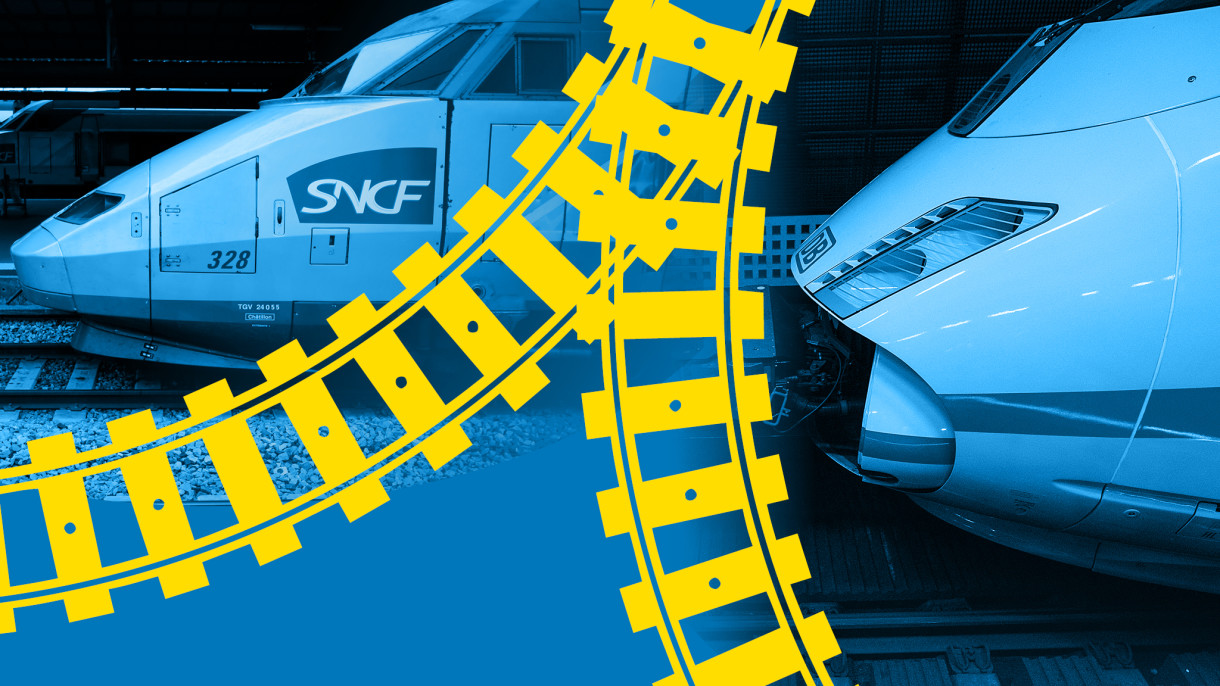
Few corporate deals can boast of being brought together with the help of a French president, or promoted as a vision of Europe’s future by a German chancellor. But the proposed merger of the rail operations of Siemens and Alstom to create a European champion has always been about more than pure business sense.
“If we want to be able to face competition with Chinese giants, we have to gather the European forces,” Bruno Le Maire, French finance minister, told the Financial Times. “The best solution was this merger.”
That is if Brussels agrees. Potentially standing in the way of the formation of this European champion is one of the EU’s purest examples of centralised power: the European Commission’s antitrust enforcement arm, led by Margrethe Vestager.
For more than 25 years it has vetted every big cross-border merger in Europe, empowered to block anti-competitive deals. It is institutionally suspicious — if not allergic — to the we-need-scale arguments of “champions”. It prides itself on being the world’s most rigorous — and independent — competition enforcer. And with Siemens-Alstom formally requesting EU approval for the deal last Friday, the merger police of Brussels know a defining test is hurtling towards them.
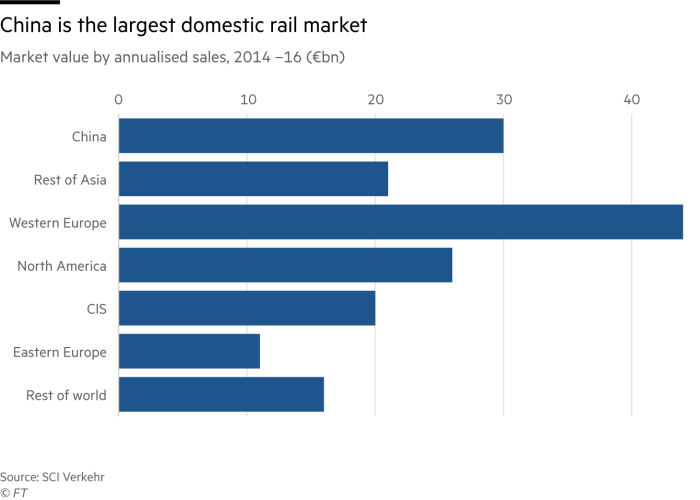
Rarely if ever has the commission been asked to pass judgment on a big corporate tie-up blessed with such effusive Franco-German political support, nor one that further concentrates what is already an effective duopoly across some of Europe’s rail markets — the combined group has revenues of €16bn.
But the new factor changing the calculus is the looming threat from China’s CRRC, the world’s biggest train maker. Indeed, the Siemens-Alstom deal comes at a time of deep soul-searching in western capitals about the competitive threat from China and its state-backed companies.
The politics surrounding such deals are already shifting, softening the national reservations that long hindered cross-border deals like the Siemens-Alstom tie-up.
The French government seems ready to take on opponents, from left and right, who depict the deal as a sell-off to Germany that puts jobs at risk. Advocates such as Mr Le Maire see the train merger opening a new era for Brussels too, where competition dogma gives way to industrial common sense and another successful Airbus would be created — a pan-European “Railbus” able to go toe-to-toe with China’s CRRC.
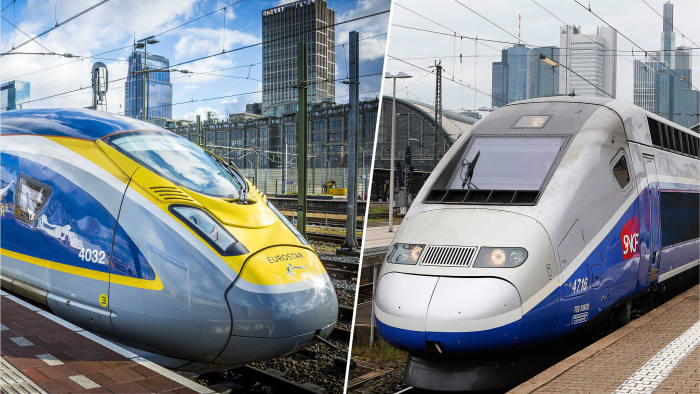
A combined Siemens-Alstom group would control 9 per cent of the global railway market, second only to China's CRRC
“This is the redline between those who believe in Europe, and those who believe in national forces,” says Mr Le Maire. “It is only right that Europe’s competition policy should help European champions emerge.”
Angela Merkel is also pressing for change. “We need global champions in various industries and our competition rules do not help us to build these champions,” the German chancellor told a gathering in Munich last week. “We need to reflect.”
Veteran lawyers in Brussels see Ms Vestager caught in a political squeeze.
“This deal should be a clear candidate for prohibition but given the political context, you have to bet it comes through,” says one lawyer involved in the case, noting the importance of the conditions that are likely to be attached to the merger. “The question is how hard the axe falls on different parts of the business. Will it still be a champion then?,” he asks.
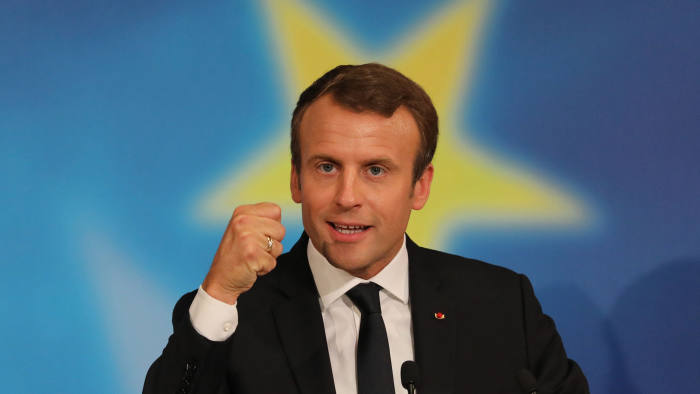
French President Emmanuel Macron insists that European champions are necessary to make the continent's companies competitive globally © AFP
Telecoms, steel, stock exchanges, chipmakers, truckmakers: there is barely a sector that has not been touted, at some stage, as European champion material.
In practice, though, few have emerged. As veteran French business journalist Jean-Michel Quatrepoint said: “European industrial policy is like a UFO, much discussed but impossible to describe.”
Successive French presidents have blamed Brussels’ overly-strict competition regime. Yet as the history of Alstom shows, national reservations are also a factor. When the French group was close to a bankruptcy in 2003 and Siemens was ready to swoop, Paris blocked any asset sales to a German group, preferring a state bailout.
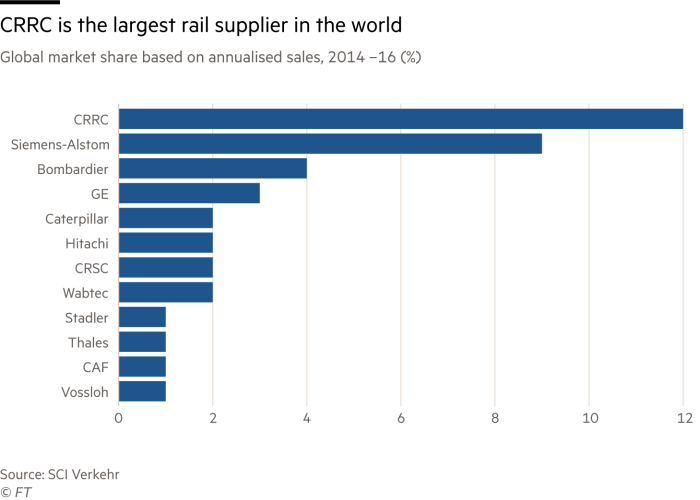
The political calculation on a potential Siemens-Alstom deal changed after a different state-engineered champion emerged in Asia. In 2015, Beijing supported the merger of CNR Group and CSR Group, creating the world’s biggest train maker, with nearly 180,000 employees, $33bn in revenue last year and 12 per cent of the global railway market for trains, services and signalling.
If the deal goes through, a combined Siemens-Alstom would generate just half that turnover and account for 9 per cent of the market, with Bombardier, the Canadian group, holding a further 4 per cent, according to SCI Verkehr data.
On the same day last September that the deal was announced, French president Emmanuel Macron gave a speech to a packed audience at the Sorbonne where he said Europe would find strength in “industrial power” and that more consolidation would make the region’s companies competitive “on a global scale”.
Europe’s most controversial deals — drinks

Brussels approved the £71bn tie-up between brewer AB InBev and its London-listed rival SABMiller in 2016, creating the world’s largest brewer with a roughly one-third share of the global drinks market. The companies agreed to sell off nearly $7bn worth of assets including many household name beer brands to secure the EU’s approval for the deal.
Like other sectors, such as steel and solar panels, the prospect of an avaricious rival bankrolled by Beijing is posing a major challenge to Europe’s incumbents.
CRRC is the dominant supplier to the protected Chinese railway market, the largest in the world; the company is an integral part of Beijing’s Belt and Road Initiative; and it enjoys operational, policy and strategic support from the government.
For an industry already facing a problem of “dramatic overcapacity”, in the words of a 2016 McKinsey report, the danger is even more acute. Rolling stock factories in Asia are 60 per cent under-used, with their European and North American equivalents 40 per cent under capacity.
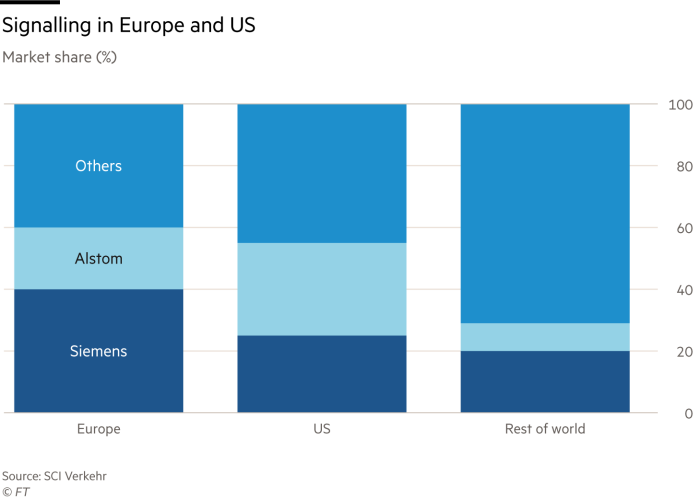
The changing global picture and China’s competitive challenge are giving the advocates of the Siemens-Alstom deal confidence that it will secure EU merger approval.
“We have a global market and a global market follows global rules,” says Joe Kaeser, chief executive of Siemens.
Across corporate Europe, the argument about the need for more scale is being made forcefully, including from banks, media and defence companies and the telecoms sector, where four US operators compare with around 150 across the EU.
Europe’s most controversial deals — telecoms

Telefónica’s €8.6bn takeover of E-Plus in 2014, creating Germany’s biggest mobile operator in customer terms, became a test case for consolidation, which the industry argues is essential to revive profits. But a tougher approach under Margrethe Vestager led to the withdrawal of the Telenor and TeliaSonera tie-up in Denmark and a veto of CK Hutchison’s £10.5bn attempt to buy O2 in Britain.
Siemens and Alstom may be optimistic about the chances of winning approval. But Mrs Vestager’s competition investigators have very rarely been convinced that markets are truly global, rather than national or regional.
In the Brussels view, companies should not be allowed to dominate national markets at the expense of consumers, just so they can succeed abroad. The efficiencies that come from greater scale are taken into account, but have yet to prove decisive in swaying approvals.
Many lawyers have tried to convince the commission to take a broader view of markets. But as Carles Esteva Mosso, the head of mergers at the commission’s competition directorate, said in 2014: “We cannot choose market definitions as we please, any more than we can change the weather in Brussels.”
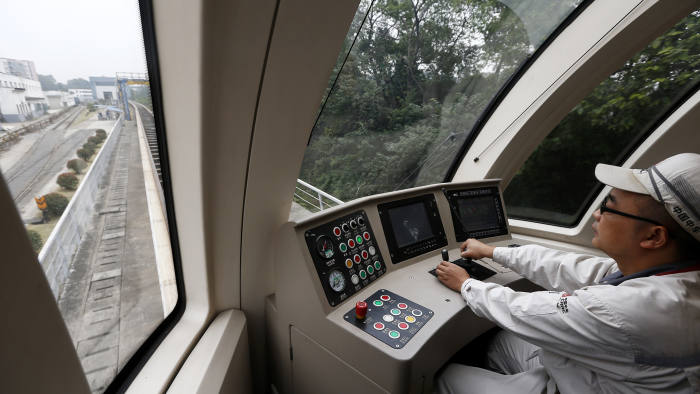
A prototype train, built by China's CRRC the biggest railway group in the world, is put through its paces in Zhuzhou city in Hunan Province © EPA
In previous railway mergers, for instance, EU officials looked at nine different markets for rolling stock alone. There were also three distinct markets for wayside equipment, two for signalling and nine for the other systems and services.
Crucially, the commission analysis is typically done at national level, rather than regional or global. Europe’s rail industry still carries the imprint of old state monopolies, which have made it hard for new entrants to break in and win contracts. Siemens and Alstom remain head-to-head competitors in many such markets in western Europe; China’s CRRC, meanwhile, has yet to win a major contract in Europe.
Advocates of the deal argue market share statistics are of limited use because they often turn on big, infrequent tenders for multiyear projects. But the Siemens-Alstom presence is unmistakably strong in some areas, with signalling posing one of the toughest competition challenges.
The group has a 60 per cent share of the European market and a 55 per cent share in North America, according to SCI Verkehr. At a national level in Germany, Denmark and Austria, Siemens-Alstom would be a virtual monopoly.
“The signalling division of the new Siemens-Alstom seems to be very strong,” says Maria Leenen of SCI Verkehr, “it could be very likely that they have to sell parts from the signalling side.”
Rival trainmakers, such as Spain’s Talgo, believe that the issue of “unfair competition” goes beyond signalling, with Siemens-Alstom cementing a protected position in its home markets.
Europe’s most controversial deals — aerospace
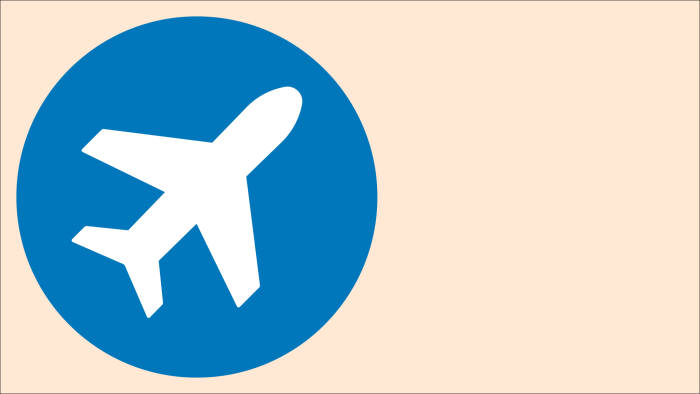
In 1991 the commission exercised its power to block a merger for the first time, preventing the takeover of De Havilland, a Canadian division of Boeing, by France’s Aerospatiale and Italy’s Alenia. Backers had hoped it would spur development of Europe’s aerospace industry, but the commission feared it would create a dominant position in markets for medium-sized commuter aeroplanes.
“As a European competitor, we are concerned that this long protectionist situation may be now exacerbated so that a single company may control all the high-speed rolling stock business opportunities in Germany and France,” the company says.
Other potential issues include the access of rivals to maintenance services and related data, and the question of whether the combined group would cut research and development spending to a level where it threatens innovation.
Supporters of the deal see these arguments as losing sight of the bigger picture. Florent Laroche, a transport expert at the University of Lyon, accepts that the technological legacy of incumbents has seriously constrained access to rail markets. But he argues such fragmentation can only be overcome by a big player driving standardisation.
“The European industry needs a European champion,” he says.
Competition officials bristle at the suggestion that overzealous competition rules have stunted corporate Europe. Many of Europe’s biggest companies reached their size through commission approved mergers, from Vivendi and Daimler to BNP Paribas and Vodafone.
Of almost 7,000 deals notified since 1990, just 27 were blocked. When faced with a potential deal harmful to competition, the usual approach is to seek specific remedies, such as asset sales or promises to restrict business practices.
Such commitments have been required by Brussels in more than 120 deals, with varying degrees of severity. Rivals expect Siemens-Alstom to face such demands, particularly in the signalling business.
“It will have to go, there is no question,” says another lawyer working on the case. “One of the businesses will have to be sold.”
Europe’s most controversial deals — finance
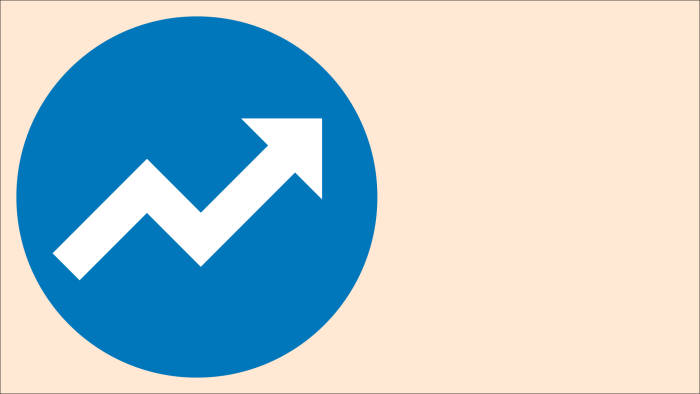
Ms Vestager blocked the merger of the London Stock Exchange Group and Deutsche Börse in 2017, after the groups refused to sell some fixed income clearing assets to address her concerns about the deal creating a de facto monopoly. The proposed merger was the third attempt in 17 years to create an Anglo-German exchange to rival US and Asian competitors.
Asset sales, if required, create a separate dilemma. Any auction may give CRRC a long-sought opportunity to establish itself in Europe — defeating the China-beating reasoning of the merger. “It does seem an own goal,” the lawyer says. “In pure competition terms, why not? But it would look foolish to anyone with a brain.”
This highlights a broader challenge facing the commission. One of its roles is to police Europe’s state aid curbs, which are the strictest in the world. Yet in vetting mergers it is unable to take account of the competitive threat posed by companies enjoying state-support from non-EU countries, such as China.
With strong Franco-German support, the EU is examining reforms to allow for much tougher screening of foreign investments in strategic sectors. But while it may stop Beijing’s encroachment into the EU market, it does not relax the competition regime that European champions must fit to their ambitions.
“When the EU merger regulation was adopted in 1989, the main concern, about foreign takeovers, if any, was not about China but about Japan,” says Sir Philip Lowe, the former head of the commission’s competition department. “There is always some country out there which people think is about to invade the entire European market.”
0 comments:
Publicar un comentario